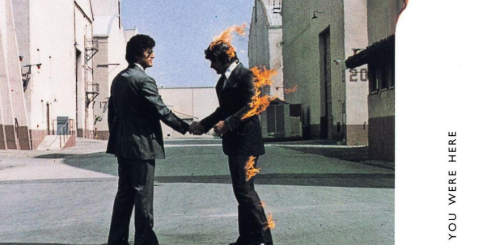Arnold Layne by Pink Floyd Lyrics Meaning – The Psychedelic Lens on Societal Taboos
- Music Video
- Lyrics
-
Song Meaning
- The Eccentric Hero or Social Pariah? – Unpacking Layne’s Identity
- The Mirror on the Wall – A Distorted Reflection of the 60s
- Deconstructing the Notion of Freedom Through Layne’s Captivity
- A Psychedelic Inquiry into Duality and Understanding – ‘It Takes Two to Know’
- The Hidden Message – Arnold Layne’s Haunting Plea for Tolerance
Lyrics
Had a strange hobby
Collecting clothes
Moonshine washing line
They suit him fine
On the wall
Hung a tall mirror
Distorted view
See through baby blue
He done it, oh, Arnold Layne
It’s not the same,
It takes two to know
Two to know
Two to know
Two to know
Why can’t you see?
Arnold Layne
Arnold Layne
Arnold Layne, Arnold Layne
Now he’s caught
A nasty sort of person
They gave him time
Doors bang, chain gang
He hates it
Oh, Arnold Layne
It’s not the same
It takes two to know
Two to know
Two to know
Two to know
Why can’t you see?
Arnold Layne
Arnold Layne
Arnold Layne
Arnold Layne, don’t do it again
In 1967, Pink Floyd released ‘Arnold Layne’, their first single, a song that immediately captured the curiosities and uncertainties of a generation experimenting with new expressions of identity and grappling with the boundaries set by society. Decades later, the track’s narrative, winding through the peculiar incidents in the life of its title character, continues to intrigue listeners and critics alike.
But ‘Arnold Layne’ is more than just a whimsical story about a man’s offbeat hobby—it is a deep dive into the fabric of counter-cultural England, a mirror reflecting the distorted gender norms, and a question posed to the moral arbiters of the time. As we dissect the song, prepare to rediscover the allure of this masterful piece, exploring layers of meaning that remain as relevant today as they did in the era of psychedelia.
The Eccentric Hero or Social Pariah? – Unpacking Layne’s Identity
To the superficial eye, Arnold Layne is a nonconformist with a penchant for pilfering apparel from moonlit washing lines. Yet, Pink Floyd paints a picture of a man who defies simple categorization, one who rebels against a society’s rigid expectations. Through their portrayal, the band challenges the audience to confront their own biases and consider the fine line between individualism and the judgment that often follows non-traditional behavior.
As Arnold is described, we’re led to question the nature of his ‘strange hobby’—is it an innocent quirk or a misunderstood cry for acceptance? The song never passes judgment, opting instead to shroud its protagonist in a veil of ambiguity that’s as alluring as it is confounding, inviting us to reflect on our capacity for empathy toward the Arnolds of our own world.
The Mirror on the Wall – A Distorted Reflection of the 60s
‘On the wall, hung a tall mirror, distorted view.’ This line does more than depict a scene; it serves as a metaphor for the warped perception of character that society often fosters. Here, Pink Floyd hints at a deeper disillusionment with the ‘baby blue’ notion of innocence and normalcy that fails to accommodate the reality of human diversity.
Arnold’s mirror is perhaps a gateway to self-reflection, or it may symbolize society’s distorted perception of him. Whichever way the mirror faces, it becomes clear that ‘Arnold Layne’ goes beyond storytelling. It stands as a challenge to listeners, coaxing them to question not only what they see in others but also to confront the reflections they have of themselves.
Deconstructing the Notion of Freedom Through Layne’s Captivity
When Arnold Layne is eventually ‘caught,’ Pink Floyd subtly exposes the inherent flaws within the carceral system. ‘Doors bang, chain gang / He hates it.’ The song prompts us to ponder the true purpose of punishment, and whether a society’s thirst for ‘justice’ genuinely rehabilitates or simply perpetuates cruelty.
Considering the song emerged during an era of significant social reform and emerging liberations, Arnold Layne’s condemnation to a life behind bars serves as a stark reminder of the cost of deviance in a world not yet ready to embrace the full spectrum of human expression.
A Psychedelic Inquiry into Duality and Understanding – ‘It Takes Two to Know’
Arguably the most cryptic and memorable lines in the song, ‘It takes two to know, two to know,’ echo the intrinsic human yearning for connection and understanding. Pink Floyd underscores the interdependent nature of perception—how both the society and the individual shape each other’s identities.
This refrain serves as a riddle, enticing audiences to explore the complexities of empathy and the notion that true recognition of another’s existence—understanding their essence—requires a shared acknowledgment that extends beyond mere observation.
The Hidden Message – Arnold Layne’s Haunting Plea for Tolerance
While ‘Arnold Layne’ can be enjoyed as an eccentric slice of sonic storytelling, its lasting resonance suggests an undercurrent of powerful social commentary. The seemingly light-hearted lyrics draw us into an examination of the human condition, the nature of prejudice, and the longing for a world in which diversity and tolerance are not just accepted but celebrated.
As the song fades out with a haunting refrain, ‘Arnold Layne, don’t do it again,’ the listener is left to wonder if the admonishment is directed at Layne himself, or perhaps at a society too quick to stifle the individuality it does not understand. What becomes evident is that ‘Arnold Layne’ is not a mere song—it is a conversation with the future, a dialogue that remains unfinished.








